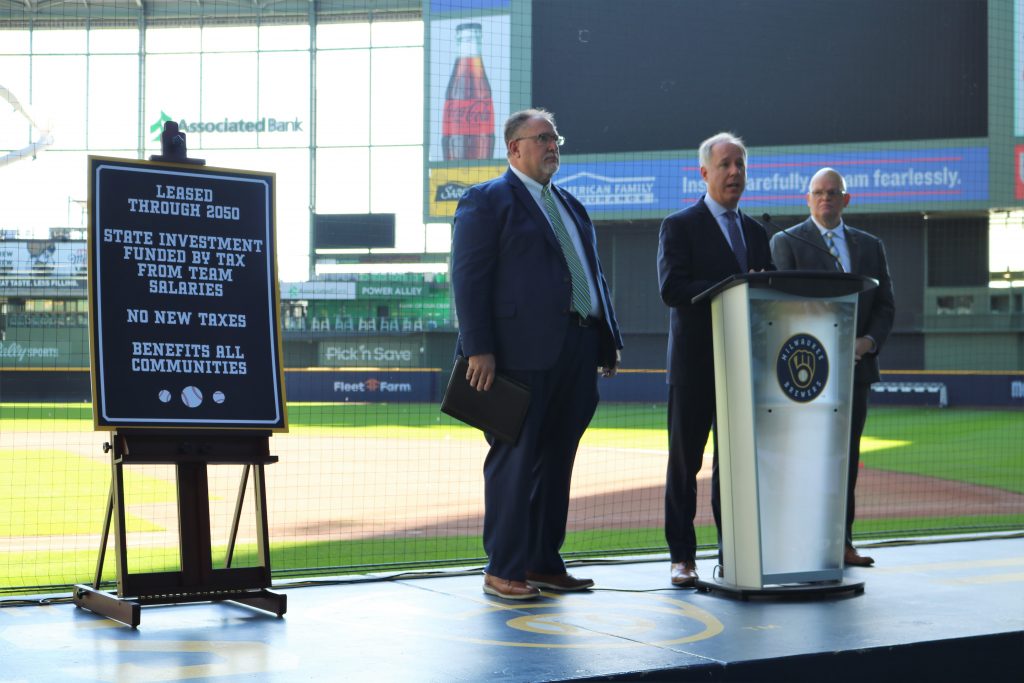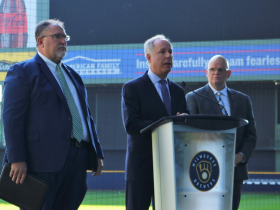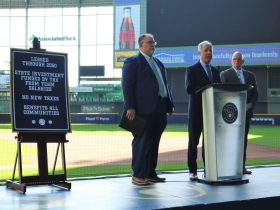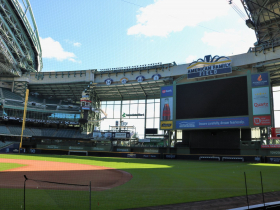Republicans Unveil Brewers Funding Plan With $600 Million In State, Local Taxes
Milwaukee would end up paying more for stadium than it did the first time.

Robert Brooks (left), Robin Vos and Dan Feyen on Monday unveiled a funding plan for American Family Field. Photo by Sophie Bolich.
Assembly Speaker Robin Vos and legislative Republicans have a plan to keep the Milwaukee Brewers in Wisconsin through at least 2050, though it costs twice as much as as an earlier proposal and involves substantially more local tax dollars supporting the team.
Through a combination of state and local taxes and a $100 million team contribution, the proposal unveiled Monday morning calls for raising approximately $700 million to repair and upgrade American Family Field.
“I think it’s a good deal for everybody. I think when they look at the deal, they will see that letting the Brewers leave would be bad for southeastern Wisconsin,” said Vos at a press conference Monday morning atop the home dugout at American Family Field. He noted that without the Brewers, the state would lose income tax revenue and be stuck owning an empty stadium.
“If the Brewers leave, we will continue to own this facility,” he said. “So the taxpayers are on the hook, whether we like it or not.”
In exchange for the new funding, the Milwaukee Brewers would sign a new lease and “ironclad” non-relocation agreement that runs through 2050. The existing agreement expires in 2030. The state would provide approximately two-thirds of the funding, approximately $400 million, with the City of Milwaukee and Milwaukee County expected to provide a combined $7.5 million annually through the life of the lease.
“This agreement requires an ironclad commitment from the Brewers that they cannot leave until 2050,” Vos said.
Governor Tony Evers negotiated an earlier proposal that involved using $290 million of the state’s $6 billion surplus with an additional $70 million in sales tax revenue in the stadium’s reserve account to cover $448 million in estimated repairs and a lease extension through 2043. The state’s contribution was to be made upfront, with the balance growing with interest. But Republicans stripped that agreement from the state budget.
On Monday, Representative Robert Brooks (R-Saukville) said he didn’t think the governor’s proposal, endorsed by the Brewers, included enough funding to cover the stadium costs. The reserve account, said Brooks and Vos, also closer to $10 million than $70 million and wouldn’t be sufficient to satisfy the current lease.
“We needed to do something sooner rather later,” said Brooks. “We were under the assumption that were was $70 million in the account as well, turns out that is not the case.”
The Republican deal requires a local funding contribution, a Brewers contribution and relies on a pay-as-you-go approach. It also adds an additional seven years to Evers’ proposed lease.
“This bill is a bill that will keep professional baseball in Wisconsin through at least 2050,” said Senate Assistant Majority Leader Dan Feyen (R-Fond du Lac).
The new deal exempts Waukesha, Ozaukee, Washington and Racine counties which originally were part of the 0.1% sales tax that funded the ballpark’s initial construction in 2001.
The five-county sales tax was terminated, without objection from the Brewers, in March 2020 after collecting $605 million and establishing an $87 million reserve fund. Then, in 2022, the Brewers said that the amount set aside was likely not enough to keep the stadium competitive long-term. The current lease calls for the ballpark to be maintained within the top 25% of all MLB ballparks.
“We, the state of Wisconsin, have a responsibility to make sure that this ballpark is maintained to Major League Baseball standards,” Brooks said.
A sign at the event touted the proposal as requiring “no new taxes,” but it is premised on the City of Milwaukee and Milwaukee County giving up revenue from new state-enabled sales taxes they haven’t even started levying yet.
“We are still in negotiations,” said Brooks of how the city and county shares would be paid. “We’ve said all along throughout our negotiations that we’re willing to listen.”
The city and county were given the new sales tax, 2% for the city and 0.4% for the county, to address a pension crisis that became a growing problem given long-flat state shared revenue.
Giving up a portion of that new revenue would require local votes, with members of the Common Council and county Board of Supervisors already announcing their opposition earlier this summer. The state, as it did for the Fiserv Forum deal, would also reduce its shared revenue payments to the city and county to extract the revenue. Leaders from the city and county were not present at the event.
Vos said he expected the deal to be voted on in October.
The Republican leaders said it was appropriate to leave out the four suburban counties this time because the primary beneficiary of the stadium was Milwaukee. A third-party report previously determined that only 38% of attendees were Milwaukee County residents.
The state’s portion of the funding is intended to come from two-thirds of the income tax revenue generated by increasing player salaries. A similar strategy was used for the 2015 Milwaukee Bucks arena funding agreement, but the total public price tag was $250 million with $80 million covered by state income taxes.
“It’s actually very similar to how we did the Bucks deal,” said Vos. “If the team leaves, it is more expensive for the state.”
A new stadium authority would be created, replacing the Southeast Wisconsin Professional Ballpark District that includes representatives from each of the five counties that paid the earlier sales tax.
“Our deal also changes the stadium board makeup to focus more on people that have interest — not a business interest, but a viable interest in knowledge of how to operate a stadium,” Brooks said.
In response to queries about a lack of Milwaukee representation on the board, Brooks told reporters that Evers is allotted four appointments. “If the governor wants to relinquish a couple of those appointments to the county executive or to the city, we’re willing to listen,” he said. “If they’re willing to pony up with the $200 million we’ve requested, we can certainly open up negotiations on representation on the board.”
In March 2023, the Brewers were valued at $1.6 billion, the 25th most valuable franchise, by Forbes. The estimated value increased by $300 million since 2022.
Owner Mark Attanasio acquired the team for $223 million in 2005. Sports team values have exploded in value in the past two decades primarily because of television rights agreements.
The deal does not require the Brewers to develop any of the parking lots surrounding the ballpark. The Bucks are developing the mixed-use Deer District neighborhood around Fiserv Forum and paying property taxes on that development. Brooks said the certainty that the Brewers would stay through 2050 would drive economic development in the surrounding Milwaukee area.
“The Brewers have stepped up in a large way,” he said. “And I think you’re going to see a lot of ancillary development in the area.”
A portion of the funding will be used to winterize the stadium, making it an accessible, year-round venue for concerts and other events. Brooks said the move will “help to increase the amount of money that we can use for all the other priorities in the state.”
The Brewers and state both analyzed what upgrades and repairs are needed at the 22-year-old ballpark. The team conducted a study that concluded it would cost $428 million to improve the ballpark to its desires. The Wisconsin Department of Administration executed a separate study that estimated it would cost between $540 million and $604 million. Details on those findings can be found in our February 2023 coverage.
Photos
If you think stories like this are important, become a member of Urban Milwaukee and help support real, independent journalism. Plus you get some cool added benefits.
More about the Miller Park Stadium Tax
- Brewers Weigh In On Parking Lot Development Proposal - Jeramey Jannene - Dec 30th, 2025
- Back in the News: Will West Milwaukee Do Development Near Brewers Stadium? - Bruce Murphy - Dec 1st, 2025
- Murphy’s Law: Why Attanasio Has Never Developed Around Brewers Stadium - Bruce Murphy - Nov 25th, 2025
- See Brewers’ Options To Develop Land Around Their Stadium - Jeramey Jannene - Nov 12th, 2025
- Stadium Authority Seeks Study to Redevelop Brewers Parking Lots - Jeramey Jannene - May 28th, 2025
- $54.9 Million in Upgrades Approved for Brewers Stadium - Evan Casey - Jan 28th, 2025
- MKE County: Brewers Ballpark Subsidy Stings County Budget - Graham Kilmer - Jul 28th, 2024
- Governor Signs Brewers Subsidy Agreement At American Family Field - Evan Casey - Dec 5th, 2023
- Gov. Evers Signs Bills to Keep Milwaukee Brewers, Major League Baseball in Wisconsin Through 2050 - Gov. Tony Evers - Dec 5th, 2023
- Council, Mayor Bickered On Brewers Deal - Jeramey Jannene - Nov 29th, 2023
Read more about Miller Park Stadium Tax here





















Move the team to 262 land and call them the Wisconsin Brewers. Milwaukee and Milwaukee County can’t afford this, and get little value from the team.
What a shell game by the Republicans: give the city and county a new revenue source, then attempt a shakedown to funnel some of that money into a Brewers subsidy.
Oh, that $400 million from the state? Instead of taking the dollars from the surplus, as proposed by Evers, these blankety-blank hucksters say it will come from the income taxes paid by the players. That means $400 million less for the state general purpose revenue fund, the money used to pay for most state services (including the salaries of state legislators and their staffs).
Yet another worthless proposal from the people who hate government but love the power it gives them.
Spend the money on replacing the Domes and upgrading the park system. More people would benefit.
The Brewers have been in Milwaukee since the early 1970s; exactly what “ancillary development in the area” is on hold because their current stadium lease expires in 2030? GOP, please share details. Otherwise I think you’re again full of BS.
Well stated, Alan. “Uncertainty over the Brewers” is what is holding up development in the area? That is total BS. Brooks is talking out of his backside.
The only thing holding up development in that area is legislators changing the law to allow development ON THE STATE-OWNED LAND around the ballpark. And the comments about only giving seats to Milwaukee on the Stadium Board if the Gov gives them up? Why would the gerrymandered GOP Legislature (with ZERO representation from Milwaukee) get the bigger say?
I believe in helping pay for the Stadium, but not with this garbage GOP package. Evers and Legislative Dems need to get a better deal, or agree to no deal and wait it out for fair maps in 2024.
I agree. The money would be better spent moving tthe Domes to a safer, better location, and updating/replacing them and maintaining the Milwaukee Co. Parks System. More folks enjoy them. Who but the well-heeled burbanites can afford to regularly attend Brewer games? In my opinion, this is another great example of how the gerrymandered maps and power hungry Republicans are ruining theis once great State. The regular working, struggling-to-make-ends-meet folks have little desire to spend their hard earned money on a Brewer game, but they do enjoy Milwaukee Co.’s many great parks. But I doubt the burbanites would appreciate, or understand that. Seems to me they think Milwaukee and Milwaukee Co.’s only purpose is to serve their whims.
Wow, this is such b.s. for so many reasons! The suburbs don’t have to pay, yet they are primarily the people who attend the games? Milwaukee doesn’t get representation unless they pay? Milwaukee taxpayers, who were told the 2% tax (which many opposed in the first place) would go to roads, police, etc. will now have to give a portion of this to the Brewers? We will be required to pay more than double what the Brewers are putting in over the span of this agreement? The 4 other counties don’t have to pay, but they get all the say?
This is so frustrating and maddening. We have the surplus, use it!!! Repbulicans hate Milwaukee because they usually vote blue and this is just another way to stick it to us!!!
I love the Brewers and want them to stay in Milwaukee forever, but I don’t buy the argument that they will leave anytime soon. Where would they go? Nashville?’Charlotte?
Baseball in southern transplant cities isn’t successful. Look at Tampa and Miami. Even though both teams have been around 25-30 years already and both are in the playoff picture this season (with Tampa having one of the best records in the MLB) total attendance in both cities combined barely tops the total Brewer 2,350,000 attendance to date in 2023. See: https://www.espn.com/mlb/attendance. Keep in mind that Milwaukee and Wisconsin support their pro teams. The grass is not greener anywhere else!